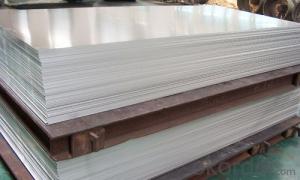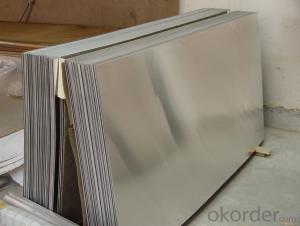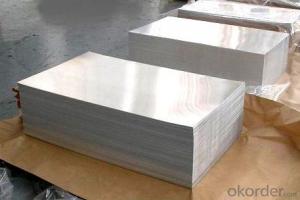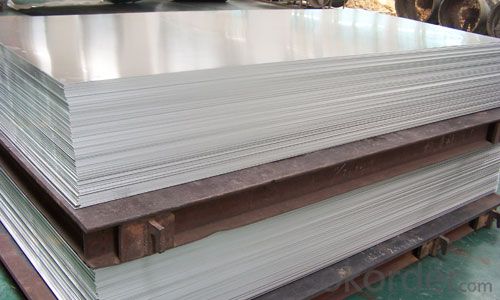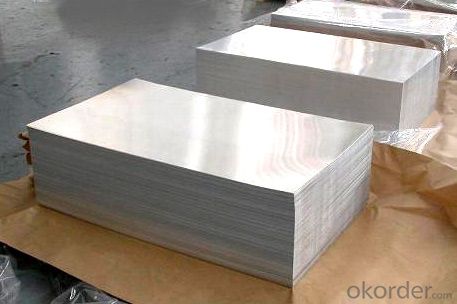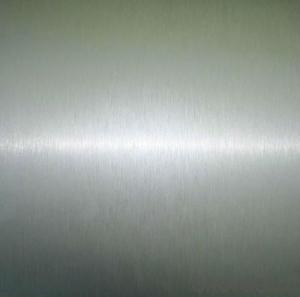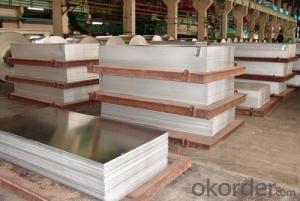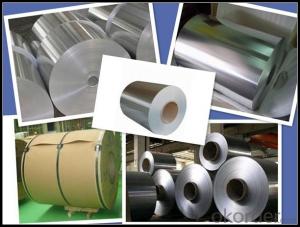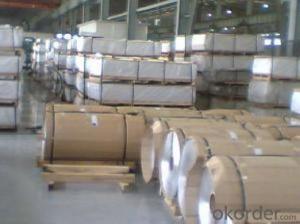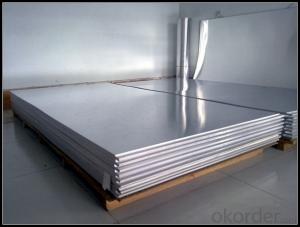Aluminum Plain Sheets Manufactured in China
- Loading Port:
- Shanghai
- Payment Terms:
- TT or LC
- Min Order Qty:
- 5 m.t.
- Supply Capability:
- 9000 m.t./month
OKorder Service Pledge
OKorder Financial Service
You Might Also Like
Packaging & Delivery
| Packaging Details: | Wooden Pallet, Wooden Case, As Customzed, etc. |
| Delivery Detail: | 15 to 25 days |
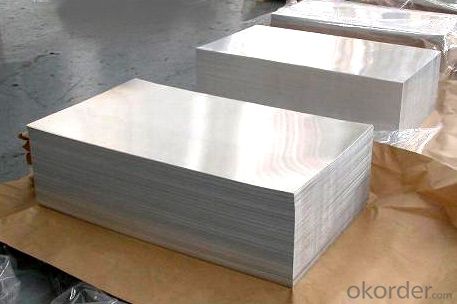
Product Description
Aluminum sheet specifications:
1) Alloy : 1050 1060 1070 1100 2024 3003 3004 3105 3A21 5005 5052 5083 5754 5182 5454 5456 6061 6063 7075 8011 etc
2) Temper: O/H12/H14/H1/H18/H32/H34/H36/H38//H111/H112/H116/H321/T6/T651/T3/T351 etc
3) Thickness: 0.1mm to 300mm
4) Width:20mm to 3300mm
5)Length: ≤ 12000mm
6) Protective film can be added
7) Production Line: DC and CC production line
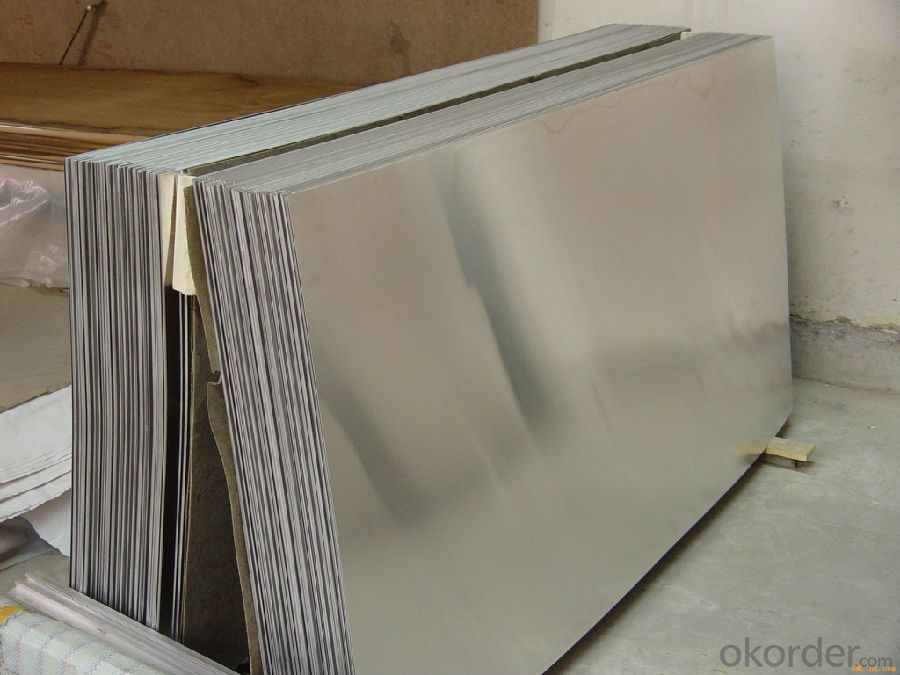
Application
Appplication:construction, decoration, transportation, cookware, machinery, moulding, airplane, PP cap etc
Our Services
1) Reply within 12 hours
2) Free samples provided
3) On-site production following-up
4) Loading inspection with container fixing
5)Third party inspection at your request
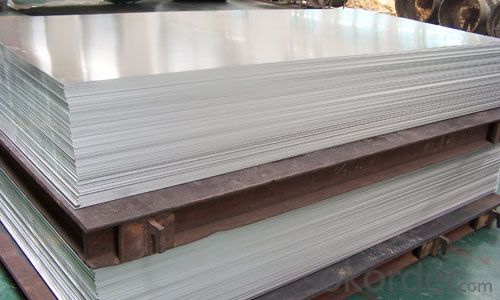
- Q: How does the surface finish of aluminum sheet affect its cleaning requirements?
- The surface finish of aluminum sheet plays a significant role in determining its cleaning requirements. The different surface finishes available for aluminum sheet, such as mill finish, brushed finish, or anodized finish, can impact how dirt, grime, and other contaminants adhere to the surface. In general, smooth and polished surface finishes like brushed or anodized are more resistant to dirt and stains, making them easier to clean. These finishes have a lower surface roughness, which creates fewer areas for dirt particles to adhere to. As a result, they can be cleaned more effectively with gentle cleaning solutions or even just water and a soft cloth. On the other hand, aluminum sheets with a mill finish or a rougher surface may require more intensive cleaning methods. The higher surface roughness of these finishes can create more areas for dirt and grime to get trapped, making it harder to remove them with simple cleaning techniques. In such cases, more aggressive cleaning solutions or abrasive cleaning tools might be necessary to remove stubborn stains or dirt particles. It is important to note that the specific cleaning requirements for aluminum sheet also depend on the type and intensity of the contaminants present. For example, if the aluminum sheet is exposed to harsh chemicals or corrosive substances, special cleaning methods may need to be employed to ensure complete removal and avoid any potential damage. In summary, the surface finish of aluminum sheet directly affects its cleaning requirements. Smoother and polished finishes are generally easier to clean due to their lower surface roughness, while rougher finishes may require more intensive cleaning methods. Understanding the surface finish of aluminum sheet is crucial in determining the most appropriate cleaning techniques to maintain its appearance and functionality.
- Q: Are the aluminum sheets suitable for marine vessel construction?
- Marine vessel construction greatly benefits from the utilization of aluminum sheets. With its exceptional corrosion resistance properties, aluminum proves itself as the ideal material for saltwater environments. Its lightweight nature combined with its strength strikes a perfect balance between durability and weight reduction, resulting in improved fuel efficiency and increased payload capacity. Moreover, shipbuilders favor aluminum due to its ease of fabrication, welding, and repair. Its high strength-to-weight ratio and ability to withstand extreme temperatures also render it suitable for various marine applications, including hulls, decks, superstructures, and other structural components. All in all, the use of aluminum sheets in marine vessel construction presents numerous advantages, establishing it as a favored choice within the maritime industry.
- Q: Which kind of glue is best for bonding aluminum sheets?
- 502 or universal glue
- Q: Can the aluminum sheets be used for manufacturing electrical conductors?
- Indeed, aluminum sheets possess the capacity to be utilized in the production of electrical conductors. Aluminum, being a remarkably conductive metal, falls second only to copper in terms of electrical conductivity. Its application is extensive in various electrical scenarios, encompassing power transmission lines, electrical cables, and wiring. Aluminum sheets can be rolled or extruded, taking on varying shapes and sizes to cater to specific conductor necessities. Furthermore, aluminum exhibits traits of being lightweight, resistant to corrosion, and economically advantageous when compared to alternative conductive materials, hence rendering it a favored option for the manufacturing of electrical conductors.
- Q: Is it possible to utilize aluminum sheets as materials for car body panels?
- <p>Yes, aluminum sheets can be used for car body panels. They offer several advantages such as lightweight, high strength, and good corrosion resistance. Aluminum is also easily recyclable and can be shaped into complex designs. However, aluminum is less resistant to dents compared to steel, which is a common material for car body panels. Despite this, aluminum's benefits often outweigh its drawbacks, making it a popular choice in the automotive industry, especially for high-performance and electric vehicles where weight reduction is crucial.</p>
- Q: Can aluminum sheets be anodized without affecting their dimensions?
- Yes, aluminum sheets can be anodized without significantly affecting their dimensions. Anodizing is an electrochemical process that forms a protective oxide layer on the surface of aluminum, which improves its corrosion resistance and durability. The anodizing process involves immersing the aluminum sheet in an acid bath and passing an electric current through it. This causes the aluminum to oxidize, creating a layer of aluminum oxide on the surface. During the anodizing process, the aluminum oxide layer grows inward into the metal, while also building up on the surface. The growth of the oxide layer is controlled by the duration of the anodizing process, and it can be precisely controlled to achieve the desired thickness. Therefore, the dimensional changes caused by anodizing are minimal and can be easily accounted for in the design phase. However, it is important to note that anodizing can cause a slight increase in the thickness of the aluminum sheet. This is due to the growth of the oxide layer on the surface. Typically, the increase in thickness is around 50% of the overall oxide layer thickness. For example, if the desired oxide layer thickness is 10 micrometers, the overall increase in sheet thickness would be approximately 5 micrometers. In summary, while anodizing aluminum sheets can cause a slight increase in thickness, the dimensional changes are minimal and can be accurately predicted and accounted for in the design phase. Anodizing is a popular and effective method for enhancing the properties of aluminum sheets without significantly affecting their dimensions.
- Q: Are aluminum sheets resistant to UV rays?
- Yes, aluminum sheets are generally resistant to UV rays.
- Q: What precautions should be taken while handling aluminum sheets to ensure safety?
- <p>When working with aluminum sheets, it's important to take certain safety measures. Always wear appropriate personal protective equipment (PPE) such as gloves, safety glasses, and a dust mask to protect against sharp edges and metal dust. Ensure good ventilation to avoid inhaling aluminum dust, which can be harmful. Use proper tools designed for metal work to prevent accidents. Keep the work area clean and free from clutter to minimize trip hazards. Be cautious of electrical hazards if using power tools, and ensure all tools are in good working order. Finally, be aware of the fire hazard potential of aluminum, especially when cutting or welding, and have fire extinguishers readily available.</p>
- Q: answer them please! i need help. the main question is # 1!!! 2. how many atoms are in one particle of aluminum dichromate?3. how many phosphorus atoms are in one particle of calcium phosphate?4. how many total atoms are in one particle of calcium phosphate?PLEASE!! who ever answers all, ill give them best answer a 5 star ratinggg. please!!! THANK YOU!
- aluminium nitrate Al (NO3)3 so no. of N atoms = 3 . ans NOTE NUMBER OF ATOMS OR MOLECULES IN ANY COMPOUND IS GIVEN BY AVOGADRO'S NUMBERS WHICH = 6.022X 10^23 avogadro's no. is no. of atoms in one gm atomic mass of any element avogadros no. is also no of molecules. present in one gm molar mass of any molecules. e.g. 1 gm hydrogen has = 6.022x10^23 atoms of H 2gm hydrogen has = 6.022x10^23 molecules of H in the same way 16gm of O2 hsa = 6.022x10^23 atoms 32gm O2 has = 6.022x10^23 molecules of oxygen. ANOTHER EXAMPLE;-- 44 gmCO2 has = 6.022x10^23 molecules of CO2 so to know number atoms weight should be given ( particle does not explain wt.
- Q: Can aluminum sheets be used for architectural applications?
- Yes, aluminum sheets can definitely be used for architectural applications. Aluminum is a versatile and lightweight material that offers numerous advantages for architectural projects. Its durability, corrosion resistance, and ability to withstand extreme weather conditions make it ideal for various architectural applications such as roofing, cladding, facades, windows, doors, and decorative elements. Aluminum sheets are available in a wide range of thicknesses, finishes, and colors, allowing architects and designers to achieve their desired aesthetic while maintaining structural integrity. The material can be easily shaped, bent, and formed into complex designs, providing flexibility and creative freedom to architects. In addition to its aesthetic appeal, aluminum is also a sustainable choice for architectural applications. It is a highly recyclable material, with a high recycling rate, making it an environmentally friendly option. Using aluminum sheets in architectural projects can contribute to reducing the carbon footprint and promoting sustainable design practices. Furthermore, aluminum sheets offer excellent thermal and acoustic properties, contributing to energy efficiency and sound insulation in buildings. The material can help reduce energy consumption and enhance occupant comfort, making it an attractive choice for architects and building owners. Overall, aluminum sheets are a popular choice in architectural applications due to their versatility, durability, sustainability, and aesthetic appeal. They offer numerous benefits and can be used in various ways to create stunning architectural designs while ensuring long-lasting performance.
Send your message to us
Aluminum Plain Sheets Manufactured in China
- Loading Port:
- Shanghai
- Payment Terms:
- TT or LC
- Min Order Qty:
- 5 m.t.
- Supply Capability:
- 9000 m.t./month
OKorder Service Pledge
OKorder Financial Service
Similar products
Hot products
Hot Searches
Related keywords
